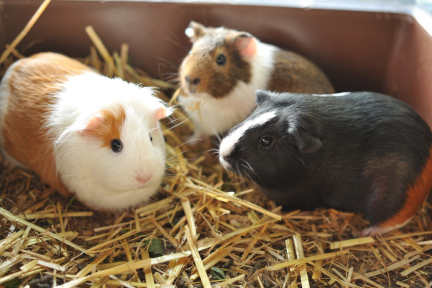The Vet Is In:
A Perfect “Pocket Pet” – the Guinea Pig
My long relationship with guinea pigs goes back to my first pair of females when I was 8 (note: too young.) They are very responsive to kind handling and good care and may live 9 years. Unfortunately, pet store staff often give inaccurate information, and many who are purchased frequently are not placed in optimal homes. Please check your local shelters to find a guinea pig rather than support stores and breeders. Unfortunately, at the end of the academic year, many guinea pigs are given up, so check with your local school as well. It is important to have a veterinarian lined up who cares for “exotics” and schedule a checkup soon after adoption. If you are adding these cuties to your family, there are several considerations to be aware of.
Bedding/cages: To keep them healthier and happier, the cage should be at least 30” X 36” for one guinea pig, or 30” X 50” for two. If you have carnivores in the house, the cage should be able to be completely closed for protection from the “hunters” (dogs and cats.) Clean the cage twice weekly, more often if you find their urinary odor too pungent; urine is often in one area which can be easily scooped daily. Do not use cedar or pine shavings — too aromatic, irritating their sinuses — but aspen shavings and “Carefresh” bedding are good. Guinea pigs crave a shelter to hide; pet stores sell “houses” that work well — just be sure that each guinea pig has a place to withdraw in the cage.

Diet: Never give legume (alfalfa) pellets or hay, but instead use grass hays and pellets (Timothy, Orchard Grass.) They love fresh veggies like lettuce (preferably dark greens, not iceberg) plus carrots, green peppers, apples, and bananas. Give more vegetables than fruits. Hay should be the biggest portion of their diet. Keep an eye out for regular fecal elimination.
Water: Guinea pigs enjoy playing with their water, so instead of a bowl, rather use a bottle with stainless steel tube that straps onto the cage from the outside, and keep it clean.
Males and females: Two males will fight, two females will not. They do prefer a companion. Please neuter the males if you have both sexes and wish to house them together, which they strongly prefer.
Nails: Unless you are expert at trimming nails in small wiggly friends, you may want to have your veterinary staff take care of long nails — do it often enough to prevent excessive length.

Dental health: Guinea pigs are rodents whose teeth will grow longer, unlike ours: if he/she is having trouble eating and is losing weight, have a veterinarian check. Teeth may need a trim, under medical supervision.
Exercise: Movement is very important, but should always be monitored to prevent your pet from being attacked by other domestic animals. While grazing outside (supervised, of course), your wee friend can be snatched by a hawk and flown away in a heartbeat.
Caregivers: Please assess whether small children have the manual dexterity and speed sufficient to prevent the guinea pig from falling or escaping outside. An adult should supervise all handling until a child has matured sufficiently.
Enjoy your new friend!
Holly Cheever, DVM
NYSHA’s VP, Dr. Holly Cheever, is a partner in a small animal practice, the Village Animal Clinic, in Voorheesville, NY. She sits on several boards for animal issues, is a speaker and consultant across the nation, and has testified before Congress about animal abuse in circuses, as well as in New York City regarding the carriage horse trade.
New York State Humane Association Humane Review, Vol.XXXVII, Winter/Spring 2021.